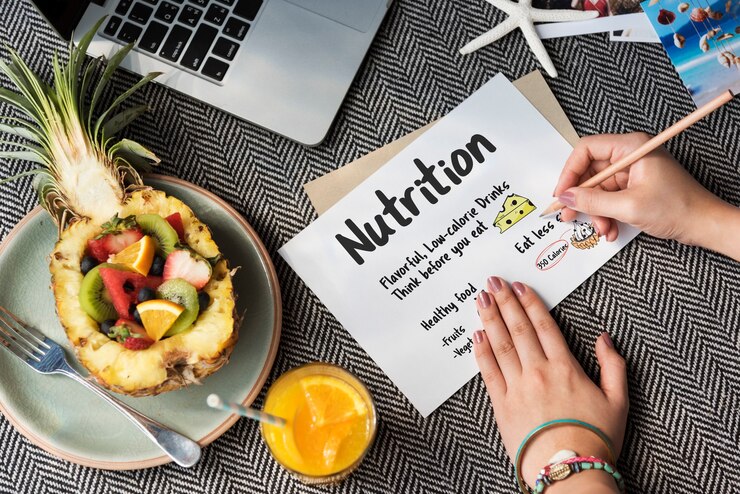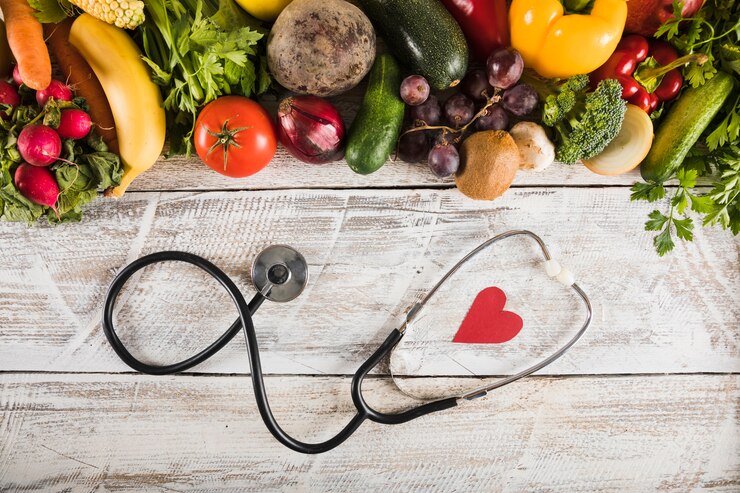Good nutrition is essential for a healthy lifestyle. The food choices we make every day affect our body’s ability to function, our energy levels, and our overall health.
While adopting healthy eating habits can sometimes seem overwhelming, making small, consistent changes can have a significant impact over time.
Nutrition tips for healthy living that will help you optimize your diet, maintain a healthy weight, and support overall well-being.
Prioritize Whole, Unprocessed Foods
One of the most effective ways to improve your nutrition is by focusing on whole, unprocessed foods.
Whole foods, such as fruits, vegetables, whole grains, lean proteins, and healthy fats, provide your body with the nutrients it needs without unnecessary additives, preservatives, or refined sugars.
Benefits of Whole Foods:
- More Nutrients: Whole foods are rich in essential nutrients like vitamins, minerals, fiber, and antioxidants.
- Better Digestion: High-fiber foods like fruits, vegetables, and whole grains improve digestion and keep your gut healthy.
- Fewer Additives: Processed foods often contain harmful additives like artificial preservatives, sweeteners, and unhealthy fats that can negatively impact your health.
Examples of Whole Foods:
- Fruits and Vegetables: Apples, spinach, blueberries, broccoli, and carrots.
- Whole Grains: Quinoa, oats, brown rice, and barley.
- Lean Proteins: Chicken, fish, tofu, beans, and lentils.
- Healthy Fats: Avocados, nuts, seeds, and olive oil.
Eat a Balanced Diet
A balanced diet meal plan is crucial for providing your body with the energy and nutrients it needs to function properly.
Eating a variety of foods from different food groups ensures that you’re getting the right mix of carbohydrates, proteins, fats, vitamins, and minerals.
How to Create a Balanced Meal:
- Carbohydrates: Choose complex carbs like whole grains, vegetables, and legumes to provide steady energy throughout the day.
- Proteins: Incorporate lean proteins like chicken, fish, tofu, and legumes, which are essential for muscle repair and immune function.
- Fats: Opt for healthy fats like those found in avocados, olive oil, nuts, and seeds to support brain function and hormone production.
- Fruits and Vegetables: Fill half your plate with colorful fruits and vegetables to ensure you’re getting a wide range of vitamins and minerals.
- Hydration: Don’t forget to drink plenty of water to keep your body hydrated and support digestion.
Watch Your Portion Sizes
Even when eating healthy foods, portion control is essential for preventing overeating and maintaining a healthy weight. Large portion sizes can lead to unnecessary calorie consumption, which may result in weight gain.
Tips for Portion Control:
- Use Smaller Plates: Eating from smaller plates can help you feel full with less food.
- Measure Servings: Use measuring cups or a food scale to accurately portion your meals.
- Eat Slowly: Taking your time to eat allows your body to recognize when it’s full, preventing overeating.
- Listen to Your Body: Stop eating when you feel satisfied, not stuffed.
Stay Hydrated
Water is an essential part of a healthy diet, but many people overlook the importance of staying properly hydrated. Water is involved in nearly every function in the body, from digestion to circulation, and even slight dehydration can cause fatigue, headaches, and impaired cognitive function.
How to Stay Hydrated:
- Drink Water Regularly: Aim for 8-10 glasses of water per day.
- Eat Water-Rich Foods: Foods like cucumbers, watermelon, oranges, and lettuce can help keep you hydrated.
- Limit Sugary Drinks: Avoid sodas and energy drinks, which can dehydrate you and add unnecessary sugar to your diet.
- Start Your Day with Water: Drink a glass of water first thing in the morning to kickstart your hydration for the day.
Incorporate Lean Proteins
Protein is essential for repairing tissues, building muscle, and supporting a healthy immune system. Incorporating lean proteins into your diet can help you feel full and satisfied, which can prevent overeating and aid in weight management.
Best Sources of Lean Protein:
- Chicken Breast: A low-fat, high-protein option for building muscle.
- Fish: Rich in omega-3 fatty acids, which support heart health and reduce inflammation.
- Tofu and Tempeh: Great plant-based options that provide all essential amino acids.
- Legumes: Beans, lentils, and chickpeas are high in protein and fiber, making them ideal for a balanced meal.
Eat Plenty of Fiber
Fiber is crucial for maintaining good digestion and preventing constipation. It also plays a role in regulating blood sugar levels, lowering cholesterol, and promoting feelings of fullness, which can aid in weight loss.
High-Fiber Foods:
- Fruits: Apples, pears, and berries are high in fiber and provide essential vitamins.
- Vegetables: Leafy greens, carrots, and broccoli are fiber-rich and low in calories.
- Whole Grains: Oats, quinoa, and barley are great sources of fiber and promote heart health.
- Legumes: Lentils, beans, and peas are packed with fiber and protein.
Limit Added Sugars
Excessive sugar intake can lead to weight gain, tooth decay, and increased risk of chronic diseases such as type 2 diabetes and heart disease.
Most of the added sugars we consume come from processed foods and sugary drinks, so reducing sugar intake is an essential step toward healthier living.
Tips to Reduce Sugar:
- Avoid Sugary Drinks: Replace sodas, sweetened teas, and energy drinks with water, herbal teas, or sparkling water.
- Read Food Labels: Check for added sugars in products like cereals, sauces, and snacks.
- Opt for Natural Sweeteners: When you need a sweet treat, choose foods sweetened with honey or maple syrup in moderation.
- Choose Whole Fruits: Instead of sugary snacks, opt for whole fruits that provide natural sugars along with fiber, vitamins, and minerals.
Eat More Healthy Fats
Not all fats are bad! In fact, healthy fats are essential for brain health, hormone regulation, and cell function. Choosing the right fats can support heart health and help reduce inflammation in the body.
Sources of Healthy Fats:
- Avocados: Rich in monounsaturated fats that improve heart health.
- Nuts and Seeds: Packed with omega-3 fatty acids, which reduce inflammation and support brain function.
- Olive Oil: A healthy alternative to butter or margarine, providing beneficial monounsaturated fats.
- Fatty Fish: Salmon, mackerel, and sardines are high in omega-3 fatty acids, which support cognitive health and reduce the risk of chronic diseases.
Plan Your Meals Ahead
Meal planning is a powerful tool for sticking to healthy eating habits. By preparing your meals in advance, you can control portions, avoid unhealthy food choices, and save time during busy weeks.
Benefits of Meal Planning:
- Prevents Impulsive Eating: Having healthy meals ready reduces the temptation to order takeout or grab unhealthy snacks.
- Saves Time and Money: Buying ingredients in bulk and cooking at home can save both time and money compared to eating out.
- Ensures Balanced Nutrition: Planning allows you to create well-rounded meals that include all necessary food groups.
Limit Processed and Fast Foods
Processed and fast foods are often loaded with unhealthy trans fats, excessive sugar, salt, and artificial ingredients. These foods can contribute to weight gain, high blood pressure, and increased risk of chronic diseases.
Healthier Alternatives:
- Cook at Home: Preparing meals at home allows you to control the ingredients and avoid harmful additives.
- Snack Wisely: Instead of chips or candy, opt for healthier snacks like nuts, seeds, or yogurt with fresh fruit.
- Make Smart Swaps: Replace processed foods like white bread and pasta with whole grain alternatives.
Living a healthy life starts with good nutrition. By incorporating whole, unprocessed foods, practicing portion control, staying hydrated, and balancing your meals, you can significantly improve your health and well-being.
Remember, it’s about making small, sustainable changes that become long-term habits.
Whether your goal is to lose weight, increase energy, or improve overall health, following these nutrition tips for healthy living can help you achieve a healthier, happier life.



